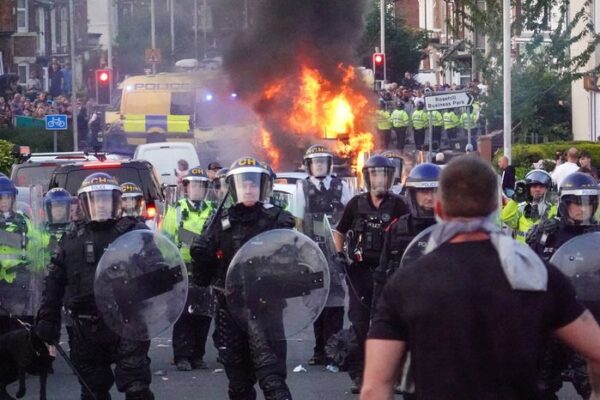Given that each political party has its own priorities, key policies, and needs to appeal to its base and an array of projects to change the country, it can be quite confusing where to start when trying to understand their different positions.
Given that each political party has its own priorities, key policies, and needs to appeal to its base and an array of projects to change the country, it can be quite confusing where to start when trying to understand their different positions.
Sermons 1-3 on Islam and Politics looked at how Islam provides support to a society, emphasises political engagement, and how Islamic politics are rooted in distributive justice and transforming the social circumstances of a community.
In this discussion we want to ask ourselves what should we be prioritising, how do we create a framework by which to recognise that hierarchy, and how do the major political party manifestos compare with those Islamic values?
Given that each political party has its own priorities, key policies, and needs to appeal to its base and an array of projects to change the country, it can be quite confusing where to start when trying to understand their different positions. Moreover, this UK election has the added bonus of the Brexit spectrum to consider. Is this election primarily about Brexit and all other matters secondary, or is Brexit just one of the key issues?
The Muslim Council of Britain (MCB) has conducted a detailed survey of its affiliates and wider Muslim communities, including speaking to over 500 Muslims across Britain about the policies they want political parties and the next government to prioritise. The following represents a consensus view of those surveyed:
1)Tackle racism and Islamophobia
2) Religious Liberty
3) Engagement with Muslim Communities
4) Safety at Places of Worship
5) Effective Health & Elderly Care Services
6) Resettlement of Refugees
7) Full participation in British Life
8) Criminal Justice
9) Equality in Education
10) Ethical Foreign Policy
For further reading on the MCB, click here.
In Islamic studies there is a science known as the Maqasid as-Shari’ah which are the higher goals and aspirations of the divine law. These set what Islam is supposed to achieve and protect for people. These are constructed from the Qur’an, Ahadith, moral principles, and so on. Let us mention a few and from there construct a guide for what some of the priorities may be.
The Qur’an states:
وَلَقَدْ كَرَّمْنَا بَنِي آدَمَ وَحَمَلْنَاهُمْ فِي الْبَرِّ وَالْبَحْرِ وَرَزَقْنَاهُم مِّنَ الطَّيِّبَاتِ وَفَضَّلْنَاهُمْ عَلَى كَثِيرٍ مِّمَّنْ خَلَقْنَا تَفْضِيلاً
(17:70) “We have conferred dignity on the children of Adam and borne them over land and sea, and provided for them sustenance out of the good things of life, and favoured them far above most of Our creation.”
ظَهَرَ الْفَسَادُ فِي الْبَرِّ وَالْبَحْرِ بِمَا كَسَبَتْ أَيْدِي النَّاسِ لِيُذِيقَهُم بَعْضَ الَّذِي عَمِلُوا لَعَلَّهُمْ يَرْجِعُونَ
(30:41) “Corruption has appeared on land and in the sea as an outcome of what men’s hands have wrought: and so He will let them taste [the evil of] some of their doings, so that they might return [to the right path].”
In the first verse we see that Allah (swt) has placed the dignity of all people as sacrosanct. If this is violated it must be returned. He (swt) has also linked our dignity to the right of travel and receiving our sustenance, meaning that where these things are removed so too is the dignity of the person.
In the second verse, we see that corruption across the world has occurred and that by our experiencing it, should mean working towards returning to a state of justice.
Two major themes can be understood here for a Maqasid which are to maintain and return dignity, and where corruption of the planet is occurring we must work to resolve it.
Ahadith also provide us useful insight. For example the Prophet Muhammad (s) said: لا ضرر و لا ضرار “Islam does not occasion harm”. Where harm occurs we must work to remove or minimalise it. Or for example he (s) said: لا خير في الوطن الا مع الامن و السرور “There is no value to living in a place except with security and happiness.”
Based on the verses and narrations, we can see that where there is maximum exposure to harm and maximum need to reduce harm, the Muslim is obligated to do so. From this perspective, in my own humble opinion, the first policy I will be looking to is that of responding to global warming. This is because it has the potential for catastrophic failure of the planet’s natural systems, and would harm the most number of people.
For example after Hurricane Erika in 2017, the Prime Minister of Dominica, Roosevelt Skerrit, addressed the United Nations saying: “In the past we prepared for one heavy storm a year; now thousands of storms form in the mid Atlantic. Before this century no generation had seen more than one Category 5 hurricane in their life times. In this century this has happened twice.”
Let us compare what the manifesto of each main party pledges on the matter of climate change and a Green Economy:
The Liberal Democrats have promised: “We will set a new legally binding target to reduce net greenhouse gas emissions to zero by 2045 at the latest, and implement a comprehensive climate action plan, cutting emissions across all sectors.” You can read more here.
The Labour Party have promised: “Our Green New Deal aims to achieve the substantial majority of our emissions reductions by 2030 in a way that is evidence-based, just and that delivers an economy that serves the interests of the many, not the few.” You can read more here.
As yet, the Conservative Party have not published a manifesto. However we can look at the government’s track record for the last nine years. According to David King, government adviser and Britain’s climate ambassador at the Paris talks that led to the landmark 2015 agreement: “The government has completely taken its eye off delivery and it has not been as consistent as it needed to be. If there isn’t support across the board from No 10, then it’s not going to happen. I wouldn’t give them a pass mark. The leadership has simply not been there.”
Based on those principles of the right of human dignity and removing harm, my second key policy would be to look to end wars and immediately halt the support for states like Saudi Arabia and Israel through weapons sales that have massacred literally millions of people. Let us again look at the manifesto pledges.
The Liberal Decorates have pledged to: “Officially recognise the independent state of Palestine, condemn violence on all sides of the Israeli-Palestinian conflict and support Israel’s right to security. We remain committed to a negotiated peace settlement, which includes a two-state solution” and “suspend UK arms sales to Saudi Arabia in response to their consistent targeting of civilians, in breach of international humanitarian law, in Yemen.”
The Labour Party have pledged to: “Immediately suspend the sale of arms to Saudi Arabia for use in Yemen and to Israel for arms used in violation of the human rights of Palestinian civilians, and conduct a root-and-branch reform of our arms exports regime so ministers can never again turn a blind eye to British-made weapons being used to target innocent civilians.”
The Conservative Party manifesto has not yet been released, however we can again ask of the recent track record as evidence and according to one headline, “Tory ministers have approved £2bn in arms sales to repressive regimes since last election”.
In our next sermon we will continue to construct an Islamic hierarchy of priorities and compare each parties policies.





